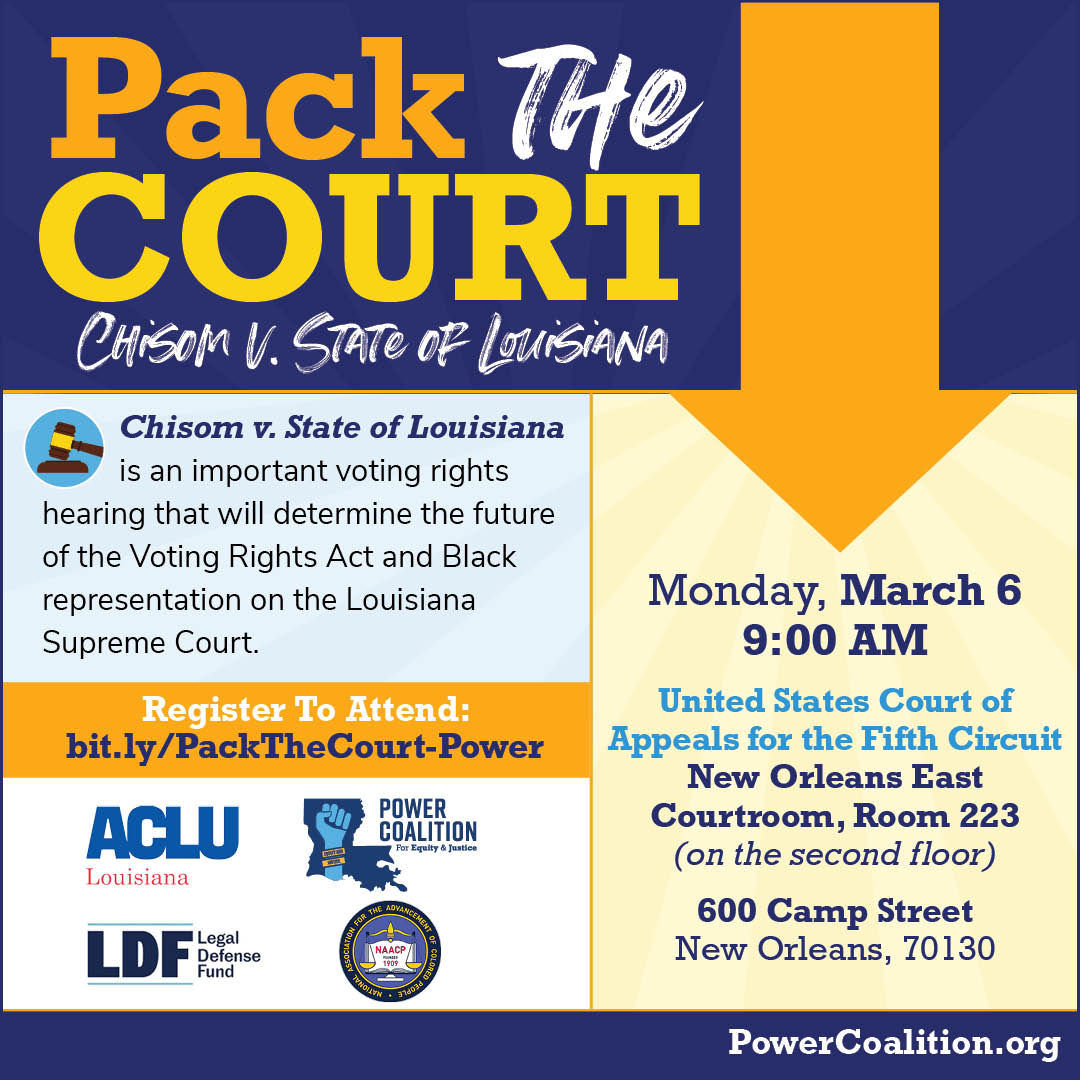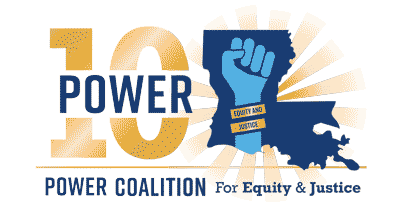
Pack the Court: Chisom vs. State of Louisiana
February 23, 2023
Re: Chisom v. State of Louisiana
Dear colleagues and friends,
I am writing on behalf of myself and retired Chief Justice of the Louisiana Supreme Court, Bernette J. Johnson. We write to extend an invitation to attend the oral argument of Chisom v. State of Louisiana, an important voting rights case which will determine the future of the Voting Rights Act and Black representation on the Louisiana Supreme Court. The argument will take place on Monday, March 6, 2023, at 9:00 a.m. in the United States Court of Appeals for the Fifth Circuit located at 600 Camp Street, New Orleans, 70130. The argument will take place in the New Orleans East Courtroom, Room 223, on the second floor.
Chisom v. State of Louisiana arises from decades-old litigation instituted by Black voters in New Orleans who were being denied the opportunity to elect a candidate of their choice to the Louisiana Supreme Court. For over a century, the legislature diluted the power of Black voters by packing them into a voting district with Jefferson, Plaquemines, and St. Bernard parishes, which all have majority white populations. After protracted litigation that reached the United States Supreme Court, the parties agreed to resolve the case by Consent Judgment – supervised by the United States District Court for the Eastern District of Louisiana – which mandated that a New Orleans based voting district be created during the subsequent redistricting cycle. To rectify the ongoing harm Black voters were experiencing, the Judgment prescribed the creation of an eighth seat on the Louisiana Supreme Court: the Chisom seat.
As you well know, Justice Revius O. Ortique Jr. became the first Black Justice elected to the Louisiana Supreme Court in 1992. He served for two years, until he was required to step down at the age of 70–the mandatory judicial retirement age at the time. In 1994, Justice Bernette Joshua Johnson became the second African American justice to be elected to the Supreme Court; she performed the obligations of an Associate Justice honorably for six years in the Chisom seat. In the year 2000, as prescribed by the Consent Judgment, the Supreme Court districts were reapportioned into seven new districts, each of which provided for the election of a single justice.
In 2000, Justice Johnson was elected by the Seventh Judicial District, the newly created majority-Black Orleans-based district; she was reelected in 2010, serving in total more than 26 years on the state’s highest court. In 2020, Justice Piper Griffin was elected by the Seventh Judicial District, becoming the third African American Justice elected to serve on the Supreme Court in its 207-year history.
Prior to the Consent Judgment in the Chisom case, not a single Black person had ever been elected to serve on the Louisiana Supreme Court! Nor had there ever been a Black-majority Supreme Court voting district. Together, the Consent Judgment and Act 776 have been in effect for thirty years, protecting the voting power of Black people in New Orleans and ensuring that Louisiana remains compliant with Section 2 of the Voting Rights Act of 1965. There is no doubt that the Consent Judgment is the only stopgap measure preserving the Seventh Judicial District, the sole majority-Black Supreme Court voting district in the state of Louisiana. And yet, the Attorney General and the State of Louisiana seek to dissolve it, claiming that the election of three Black justices (Justice Ortique, Justice Johnson, and Justice Piper Griffin) is sufficient to show that racial gerrymandering no longer exists.
Quite the contrary, we have enjoyed Black representation on the Louisiana Supreme Court solely because of the protections conferred by the Consent Judgment. Without the Consent Judgment in place as a protective measure, the legislature would be free to once again draw racially gerrymandered voting districts that eviscerate Black voters’ right to elect a candidate of their choice. As United States Supreme Court Justice Ruth Bader Ginsburg argued in her dissenting opinion in the Shelby County v. Holder voting rights decision, “Throwing out preclearance when it has worked and is continuing to work to stop discriminatory changes is like throwing away your umbrella in a rainstorm because you are not getting wet.” In Louisiana, we are still experiencing the rainstorm of racial gerrymandering. Dissolution of the Consent Judgment will mean that Black voters in the Seventh Judicial District will lose their right to elect a candidate of their choice to the Louisiana Supreme Court. The Court might very well return to the all-white body it had been for nearly 179 years before the Chisom case made it racially diverse.
For these reasons, we encourage you to join us in court on Monday, March 6th at 9 am to stand in solidarity with the ACLU of Louisiana, the NAACP Legal Defense Fund, the NAACP, the Power Coalition for Equity and Justice, and others in advocating for fair and just representation for Black voters. Our voting rights are on the line, and it is critical that we play a role in making public institutions more transparent, accountable, and effective.
Please feel free to contact Nora Ahmed, Legal Director with the ACLU of Louisiana, with any questions at 504-522-0617 or email Nette at narchangel@laaclu.org.
Sincerely,
Bernette J. Johnson, Retired Chief Justice, Louisiana Supreme Court
Alanah E. Odoms, Executive Director, ACLU of Louisiana


